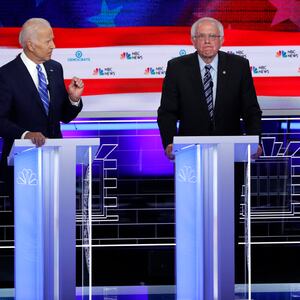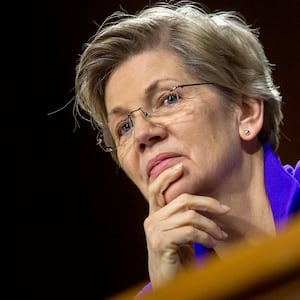Former Vice President Joe Biden has used Barack Obama’s beloved status among Democratic voters to insulate him from criticism from the massive field of candidates jockeying to be the next president.
But in recent weeks, the Democratic frontrunner has had that legacy used against him, with his competitors pointing the to shortcomings of the last Democratic administration as evidence that Biden’s not up to the task of leading the next one.
“Barack Obama, personally, is incredibly popular among Democratic primary voters,” Karthik Ganapathy, a progressive consultant now running his own firm, told The Daily Beast. “And also at the same time, there’s a growing recognition that income and wealth inequality got worse under his eight years, the climate crisis got worse during his eight years, deportations went up during his time in office, and so on.”
The idea that the Obama legacy would be anything other than a massive positive for Biden as he navigates the 2020 Democratic party has been treated as indisputable within Democratic circles. And for good reason. A CNN poll taken in early 2018 found that he had a 97 percent favorable rating among Democrats.
For a while, fellow Democrats running for the White House seemed content to simply avoid challenging the former VP as he repeatedly referenced his time in the Obama administration when touting his work on health care and beating back attacks over his record on race relations.
But that hesitancy has softened in recent weeks. On issues stemming from immigration to health care and foreign policy, the 2020 candidates have been increasingly critical in their public assessments of the Obama administration. And they’ve used opportunities from the debate stage to candidate forums to try and turn Biden’s ties to the former president from an overwhelming asset into something more complicated.
Senator Bernie Sanders’ (I-VT) campaign has used Obama’s own words to challenge Biden’s notion that Obamacare simply needs to be built upon. Senator Kamala Harris (D-CA) challenged Biden over the Obama administration's deportation policies. Senator Cory Booker (D-N.J.) backed off support for the Obama administration’s 2015 Iran nuclear deal as originally written. And Governor Jay Inslee (D-WA) has attacked Biden for a naivete about dealing with Republicans—in what has been interpreted as an implicit rebuke of Obama’s own failure to fully grasp GOP recalcitrance.
The subtle targeting of Biden has come as Democratic activists and progressives have continued to grapple with the Obama legacy as well. In particular, the Trump administration's family separation policy and inhumane conditions in detention facilities has sparked a broader conversation among Democratic voters about whether the Obama administration’s own deportation policies laid the groundwork for the current controversies.
At least two times in the last month, protesters have faced down Biden to demand an apology for the three million deportations that occurred during the Obama administration. Activists with Movimiento Cosecha, an immigrants rights organization, held a protest at Biden’s Philadelphia campaign headquarters over a week ago and subsequently confronted him at a New Hampshire campaign stop. Through their “Dignity 2020” plan, they called on Biden and his other competitors in the field to pledge to end detention and deportation, immediately legalize the estimated 11 million undocumented immigrants in the United States and reunite families separated during the current and past administration.
“We wanted the general public to understand that just defeating Trump in 2020 is only part of the solution,” Carlos Rojas Rodriguez, an organizer with the group, told The Daily Beast. “And there’s a lot of people that think that if Trump was no longer in the White House that the immigration crisis would go away and that’s just not true.”
Rodriguez, who is now a citizen but lived undocumented for 10 years, said they’re closely tracking how other candidates have been responding to questions about Obama’s immigration record and are tentatively planning to have a presence in Detroit leading up to the next Democratic presidential debate.
Already, they’ve seen some candidates take a harder look at the legacy.
During the first Democratic debate in Miami in late June, Sen. Harris made a point of voicing dissent with President Obama’s use of the Secure Communities program, which allowed for local authorities to share fingerprints of those in jail with federal authorities. Obama ended the practice in 2014 but Trump restored it in 2017.
“On this issue, I disagreed with my president, because the policy was to allow deportation of people who by ICE's own definition were non-criminals,” Harris said, though the degree to which she did is somewhat questionable.
More recently, Julián Castro who served as the secretary of housing and urban development under Obama, said that he believed the administration had been too harsh when it came to immigration, a shift from prior stances. “I have learned the lessons of the past. It seems like Vice President Biden hasn’t,” he was quoted as saying at the League of United Latin American Citizens convention last week.
But the criticism has extended beyond the issue of immigration. In the first debate, Booker said that the 2015 Iran nuclear deal, a landmark foreign policy achievement in Obama’s second term, could have been better. Many, including Biden, have also introduced sweeping climate change plans with hallmarks of the Green New Deal and taken a No Fossil Fuel Money pledge, which activists have seen as a necessary corrective to the Obama administration’s lack of action on the drastic threat of climate change.
“We would love to see candidates pressure Biden on that legacy, specifically looking at the increase in oil and gas drilling on public lands, in the U.S. in general,” Garrett Blad, a spokesperson for the climate action group Sunrise Movement, said, noting that a climate-only debate could foster these kinds of discussions. “And question him on those things. We’re glad to see that Biden has taken the No Fossil Fuel money pledge and has done what Obama didn’t do in denying that influence of the oil and gas executives and lobbyists on his campaign.”
And this past week, as Biden and Sen. Bernie Sanders (I-VT) have offered differing plans for the nation’s health-care system, the latter has pointed to Obama’s own language about Medicare for All being a “good new idea” and hit the former vice president for being too timid in his desire to build off of Obamacare.
Biden's campaign declined to respond on the record. But some Obama veterans have not been surprised that the legacy they build is now being more directly challenged. But while they encouraged candidates to have a conversation about improving on the Obama administration, they also cautioned that it needed to be done carefully.
“It’s imperative for all candidates to offer an agenda that builds on what Barack Obama accomplished and there is room for good faith criticism of the things we didn't do or could have done better,” Dan Pfeiffer, a former senior adviser to the president said. “However, Obama has a 96-percent approval rating among Democrats so a strategy to beat Biden by going after the Obama legacy seems unlikely to succeed.”
But the demands of the moment, from inequality to mounting student loan debt and a global climate crisis, have led a majority of the field to aim even higher than the lofty ambitions of Obama’s first presidential campaign.
“If in 2008, we needed change, in 2020 we need results,” Rebecca Katz, a longtime progressive Democratic consultant, said. “That’s the difference.”








